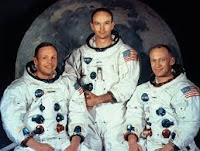In this episode - One Giant Leap: 55 Years Later . . .
“Houston, Tranquility Base here. The Eagle has landed." - Neil Armstrong.
It's hard to believe that today marks the 55th anniversary of one of humanity's greatest achievements: the first moon landing.
I vividly remember July 20, 1969. Reports say over 57 million people were glued to their TVs, just like me, captivated by the suspense of that historic moment. Watching the original CBS broadcast was a defining experience.
In the 1960s, NASA's Apollo program seemed like science fiction. As a 13-year-old, I was mesmerized by Walter Cronkite's coverage on our black-and-white Zenith. For a kid who devoured science fiction, this was the ultimate reality.
But behind the awe-inspiring success, the Apollo missions were fraught with peril. The astronauts faced constant dangers, from the Saturn V launch's immense power to the vacuum of space and its unforgiving environment. A single technical malfunction or human error could have resulted in disaster. The world held its breath as reports unfolded over the eight-day mission.
Imagine Neil Armstrong and Buzz Aldrin piloting the tiny lunar lander amidst the moon's dusty plains, with limited fuel and an uncertain landing site. And Michael Collins grappled with the anxieties of orbiting the moon alone, waiting for Armstrong and Aldrin’s safe return to dock with the command module.
Their courage, skill, and unwavering focus were the foundation of this monumental achievement.
Looking back, the advancements in communication, medicine, space travel, and societal progress are clear. But the Apollo program was a beacon of hope amidst the Vietnam War, the Cold War, the Civil Rights Movement, and political turmoil.
1969 was a year of cultural milestones: Woodstock, the Miracle Mets, the Beatles' breakup, Nixon's presidency, Eddie Merckx's Tour de France victory, and the birth of the internet with ARPANET. Yet, on July 20th, the world united in witnessing history.
Let’s put this into perspective: Sputnik's launch in 1957 ignited the space race. President Kennedy's 1961 challenge to land a man on the moon before the decade's end spurred national determination. As astronaut Michael Collins noted, over 400,000 people contributed to developing the technology, from computers and software to spacesuits and the colossal Saturn V rocket.
Has the pace of technology made us forget the immensity of this achievement? I think not. The 55th anniversary has sparked renewed interest, proving that the Apollo era still captivates millions.
Einstein said, "Time is relative." Thanks to television and YouTube, we can revisit this incredible moment. For me, it's like time travel.
So, go to YouTube, search for Apollo 11, and witness this historic achievement again or for the first time.
I'm Patrick Ball. Thanks for listening. See you in the next episode.


Comments